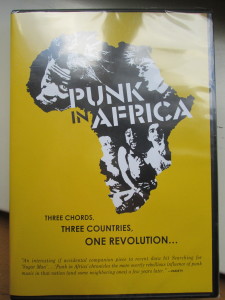[A new music documentary by Peligroso Productions, Meerkat Media and Bohemian Lion; distributed by MVDVisual.com] Website: www.punkinafrica.com
 If you only buy one DVD this spring, you might want to consider buying Punk in Africa; which chronicles the secret history of how young musicians in South Africa, Mozambique, and Zimbabwe helped support social change in their countries during the 1970s, ’80s and ’90s.
If you only buy one DVD this spring, you might want to consider buying Punk in Africa; which chronicles the secret history of how young musicians in South Africa, Mozambique, and Zimbabwe helped support social change in their countries during the 1970s, ’80s and ’90s.
Here in the USA we are familiar with how the hip-hop revolution changed the sound and style of popular music, and brought new attention to America’s urban problems and the lifestyles of urban youth. What we may be less familiar with is how teenage musical trends in other countries impacted the cultures of other countries. In the 1970s South Africa was the richest nation on the African continent, and yet was being criticized by most of the world for its oppressive political policy of “Apartheid”, a legal system which kept black, white, and mixed-race South Africans economically and socially separate from one another. In the 1970s, college student all over the world organized protests demanding their schools and governments take all monetary support away from South Africa. Economic boycotts of South Africa began in Europe and the USA. The British ska/punk band The Specials recorded a hit single called “Free Nelson Mandela.” But in South Africa and the black African countries that bordered it, teenagers in high school and college who didn’t agree with South Africa’s racial policies were limited in what they could do to protest Apartheid.
This movie collects vintage video footage of live performances and interviews with young people who lived through that dangerous revolutionary era to finally show the world some of the things South African youth could (and did) do to encourage South Africa to become more racially democratic. Interracial rock bands (illegal by law in South Africa) with names like Wild Youth, Power Age, National Wake, Kalahari Surfers, Such, Safari Suits Freak, Sibling Rivalry and Jagwa Music lived together in urban communes and gathered in tiny nightclubs or recording studios to play protest material which was banned in most of Southern Africa. In this movie we get to hear Illegal bootleg tapes and 7-inch vinyl records that were originally traded among fans and members of this rock and roll movement. Until the fall of Apartheid, people could be arrested for playing these songs on radio and in public!
But by the 1990s much had changed. This film also celebrates the African-inspired ska and reggae dance bands which emerged once South Africa became democratic and political turmoil stabilized in Mozambique and Zimbabwe. Issues of identity and economic struggle in the aftermath of civil war are still being expressed in music in all these countries, but especially by the children of the white Afrikaans minority in South Africa. If you are curious about change and youth culture in the multi-ethnic countries of southern Africa, “Punk in Africa” is a good place to begin your research. Winning critical acclaim on the international film festival circuit in 2012 and 2013, “Punk in Africa” is a worthy successor to the Oscar award-winning music documentary (also about youth music in South Africa) “Looking for Sugarman.”
By Carol Cooper